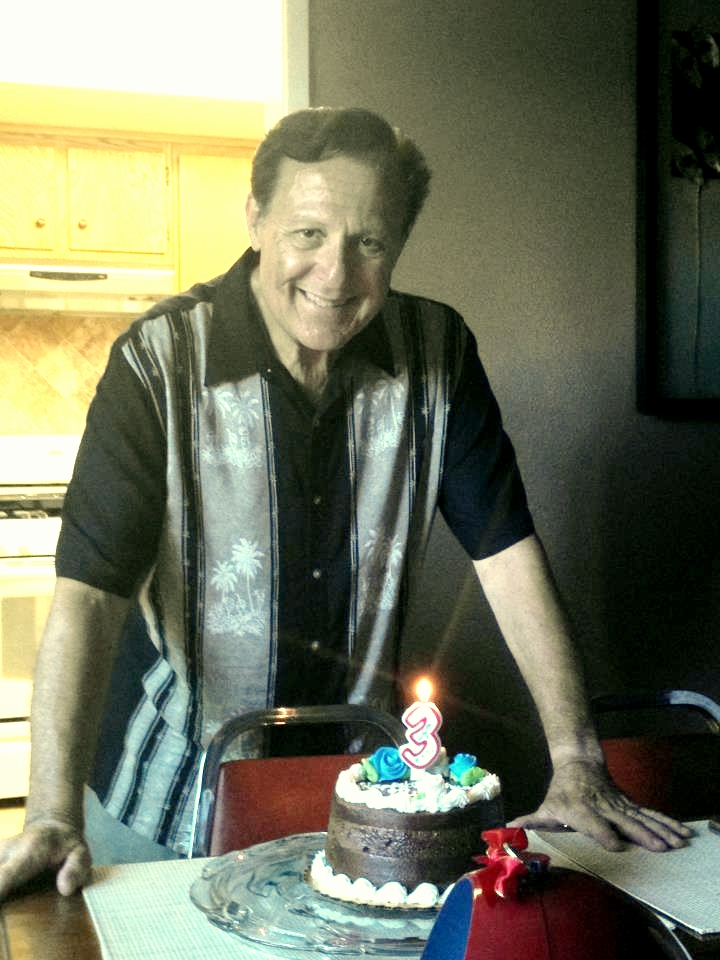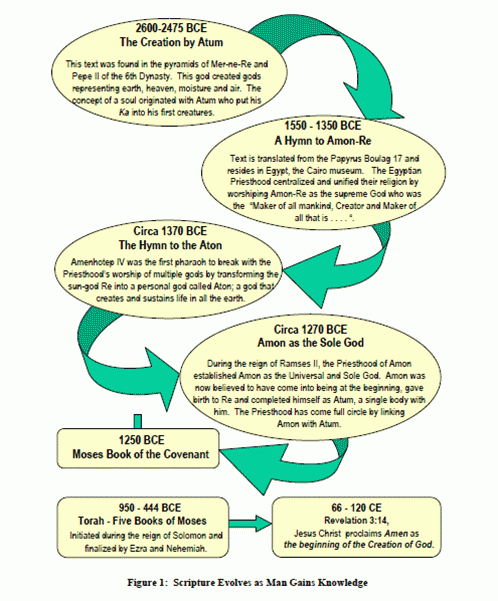It is rare that an exceptional author, retired lawyer, teacher of philosophy and law, and talk show host in the UK would take the time to write a perceptive and in-depth review of a historical novel titled AMEN, the Beginning of the Creation of God. Before providing a review by this exceptional man, Mike Voyce, it would be fair to give the reader an overview of the scope of the history presented in the book by introducing the reader to Figure 1.
It illustrates that scripture has evolved incrementally over many centuries beginning with Egyptian text created circa 2600-2475 BCE, titled The Creation by Atum. Almost a thousand years later, the Egyptian priesthood wrote A Hymn to Amon-Re where God is defined as "the Maker of all mankind, the Creator and Maker of all that is." Less than a century later, Amonhotep IV, also named Ikhnaton by the Egyptologist James H. Breasted, transformed the sun-god Amon-Re into a personal god called Aton. Ikhnaton's The Hymn to the Aton presents an appreciation of god as the source of all life forms created in all the earth. One hundred years later, the Priesthood of Amon embraced Ikhnaton's vision of god but retained worship of their former god by creating the hymn Amon As the Sole God.
The Egyptian priesthood went full circle by linking Amon with Atum by instilling the idea that Amon came into being at the beginning, gave birth to Re and completed himself as Atum, a single body with him. From the scripture (beliefs contained in the hymns) of the Egyptians, Moses walked out of Egypt and continued the belief in one God, which he made unique to the Israelites. But it was more than a thousand years later that the old and new testaments were completed whereby Jesus proclaimed in Revelation 3:14 that Amen is "the faithful and true witness the beginning of the creation of God."
Mike Voyce's review of AMEN, The Beginning of the Creation of God follows.
AMEN, The Beginning of the Creation of God
Review by Mike Voyce
No doubt it is extremely flattering that the author has quoted me at the beginning of his book. In fact I read the whole series and reviewed the first, a review Mr Ginex kindly reproduced. As chance would have it, the great Sigmund Freud was much taken up with the same story, following very similar lines of investigation and reasoning to that in Amen. I'm bound to say, Mr Ginex work is a great deal more readable; but it is not flattery or the footsteps of the great which lead me to comment again.
Now we live in a new astronomical age; no, the Earth did not disappear in a puff of smoke on December 21st 2012. Reality does not move in such predictable ways, but a revolution is occurring in our understanding for all that. Nick Ginex would, himself, deny being an incendiary; his work is far too scholarly and well founded, yet he is part of that revolution. What he does, very quietly and carefully, is set light to a bonfire of all our errors of religious tradition and culture, errors that have grown and persisted over many centuries. He does it with such charm and modesty, giving time for the reader to absorb the evidence, so that it is impossible to avoid the enlightenment his books bring.
I have watched Mr Ginex defuse the objections of the skeptic and the bigot without asperity or condescension; and it is refreshing, after the strident times we've lived through, to see someone quietly present the truth we should all know.
In Amen you will find a number of revelations; in fact, you're in for a treat.
We live at a time when authority figures seem to have lost sight of the meaning of "truth," 'spinning' cheating and dissembling to promote their own views and goals they have lost touch even with themselves. Being given the meaning of Amen at the beginning of the book, I am taken back to Ma'at, the ancient Egyptian essence of Truth. It is in the spirit of Ma'at you can take the word Amen, and the whole of this book. Indeed, Amen explains how Amen became the Lord of Truth.
Mr Ginex deals masterfully with a great sweep of Egyptian history, closing the gap between our understanding and Egyptian understanding in most remarkable ways; for instance his explanation of ka or soul outstrips what many modern theologians can offer.
(Note: You can view every article as one long page if you sign up as an Advocate Member, or higher).






